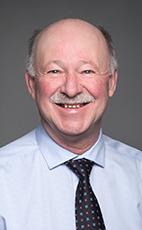Mr. Speaker, I am pleased to address Bill C-110, which I will refer to as the veto act. First, let us ask ourselves this basic question: Who speaks for whom, in Quebec? Let us look at that question in the context of the House of Commons.
Members of the Bloc Quebecois keep saying: "We are the ones speaking for Quebecers". I am sorry, but there are also Liberal members representing Quebec ridings. There are 20 of us here who speak for Quebec. Furthermore, an independent member, who sits next to me, as well as a Conservative member, also speak for Quebec. Therefore, Bloc members are not the only ones representing Quebec's interests in this House.
Let us not forget that Quebecers voted no in the referendum. Consequently, it is the Quebec Liberal members of this House, not the Bloc members, who won the referendum, albeit by a narrow margin. As member for Brome-Missisquoi, I can certainly speak on behalf of the majority of Quebecers who voted no.
It is true that those who voted no also expressed a strong desire for change. Not a desire to separate, but a desire for change. Even a leader of the yes side, Mr. Dumont, says so in today's issue of La Presse : ``If Quebecers had said yes, we would be in the process of implementing the plan that had been drawn up. However, this is not the case. The no side won by pledging to make changes. Let us see what they have to offer. This is not my first choice, since I was on the opposite side during the referendum campaign''.
The Leader of the Action Démocratique does not think that his party members will reject his position. He adds: "Our post-referendum strategy is simple. We must look after our economy and our public finances. As for Ottawa, it must define the changes promised during the campaign. We will let them work and, if they make a proposal, we will look at it". So, the desire for change expressed during the referendum campaign is definitely not a desire to separate.
The changes that people are asking for from their federal elected representatives are changes that affect them. They are not changes that would make Ottawa or Quebec bigger, but changes that reflect people's needs. This is what is important. Those who count are those who sent us here. We are accountable to them. But what changes do these people expect from us?
As I see it, there are two types. One year ago, I was campaigning to represent my party in Brome-Missisquoi. Then the by-election took place, followed by the referendum. In that one year, I spent more time campaigning in Quebec than I did in this House.
I talked to a lot of people during the past year. What kind of changes do people want? There are two kinds. First, a change in the way we do things and second, recognition of our way of life.
First, the way we do things. When you go out and meet people, they tell you: "We are fed up with taxes. We are being taxed out of existence. We are fed up with bureaucracy and red tape. So why not let Quebec and Ottawa get together and see whether something can be done about getting rid of all this duplication? Why not give a little more power to the private citizen?" People want to be involved.
As for recognition of our way of life, I think that is what people want, along with recognition of Quebec's language, culture, legal traditions and institutions.
A resolution was presented in this House to recognize the people of Quebec as a distinct society. A bill was introduced more or less at the same time-the bill we are debating now-that gives veto powers to Quebec and other regions in Canada. It is not perfect, but is perfection possible in this world? Is it be better to entrench this in the Constitution than to have a bill? Yes, it would be better.
Soon, in 1997, there will be a meeting of provincial premiers. Yes, it is better.
Would it be better to have more rather than fewer regions? I am not sure. But I do think the government has made a very good start by putting something on the table quickly after the referendum.
So what do we do now? What do we do? After the veto bill we are debating now is adopted, we will see if by 1997, we can reach a consensus within this country, within Canada. We will see whether we can constitutionalize, perhaps by 1997 or whenever, the concept of distinct society.
But, as I said earlier, the citizen comes first. We will have to prepare a package of changes, changes that are crucial and thorough, and we will have to do it now, but we should keep it simple: look at duplication, decentralize administrations and standardize paperwork. I think we should go for solutions that have a direct impact on the public.
We must also make the citizens of this country proud to be Canadians. And part of that is teaching Canadian history in our schools. Part of it is young people knowing the words of our national anthem. Part of it is flying our flag everywhere. Part of it is encouraging Quebecers to meet people and travel in other provinces and vice versa.
The veto powers we are discussing today are like the oil I put in the hydraulic system of my backhoe so I can raise the shovel.
It is important that all of us in this House, irrespective of our political affiliations, have only the interests of the citizen at heart.

